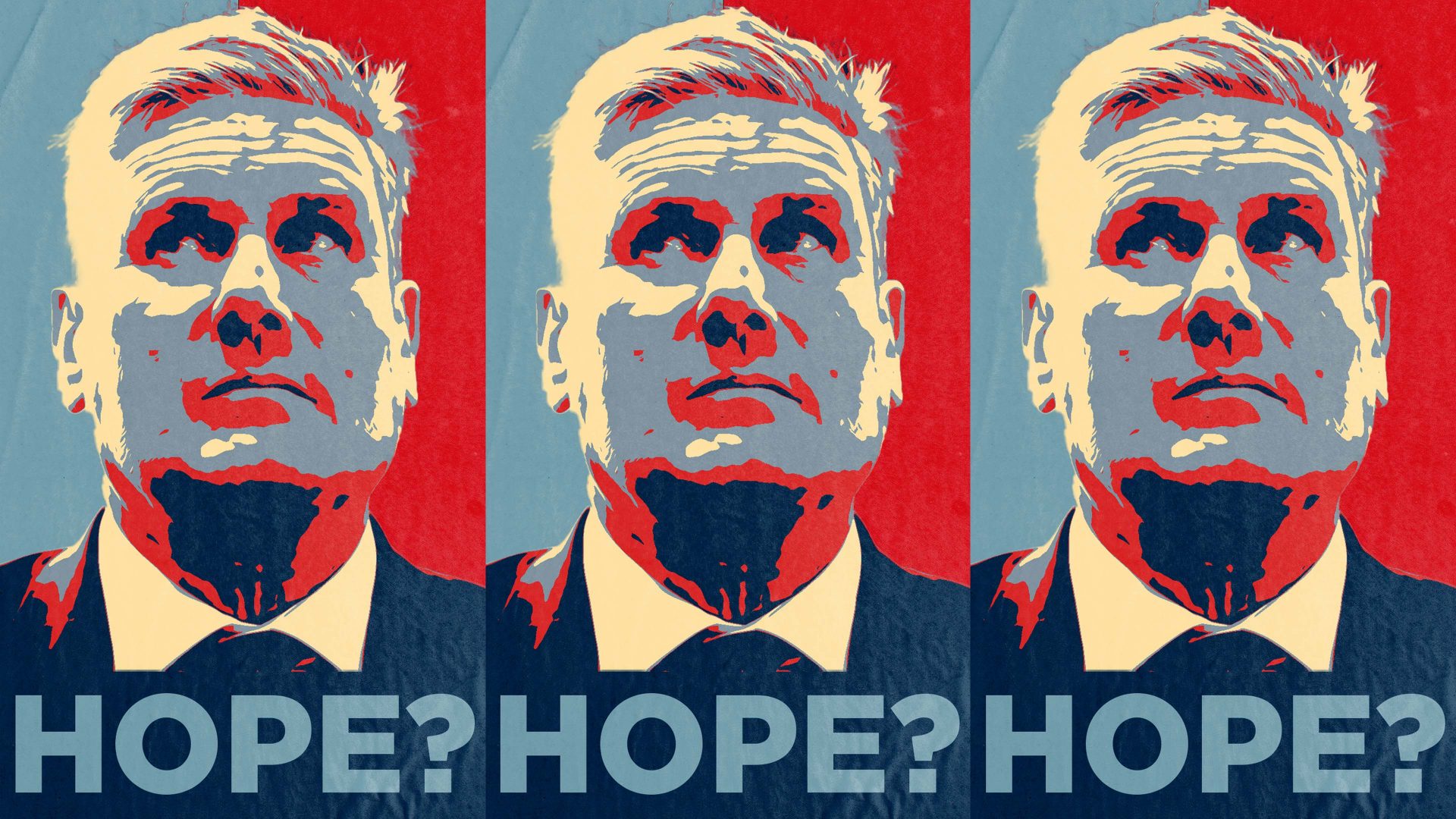For months, I have been wondering why the approach of a general election in which Labour is likely to win handsomely has felt so little like 1997. Where is the excitement, the energy, the sense of collective anticipation?
And yes, of course: I understand that Keir Starmer is not Tony Blair, that the economic context in 2024 is very different, and that not every significant Labour victory has to be heralded by a golden era in British indie pop.
Still: after 14 years of Tory rule, you might expect a mood of something at least resembling hope to be coursing through the nation’s veins. And, sad to say, it really isn’t.
The polls consistently indicate both that Labour will secure a hefty majority and, contrarily, that this will be delivered by voters who have no great enthusiasm for the party or its leader. This could easily be a historic election, statistically speaking, accompanied by almost no sense of history.
Which brings me to a bleak recognition. Only in the past week have I realised why I feel no echo of 1997, or of the dynamic arrival of New Labour. And that is because the closest precedent isn’t Blair’s first victory. The closest precedent – oddly enough – is the vote for Brexit.
The fit is far from exact, of course. The outcome of the 2016 referendum was close, which is not what any of the pollsters expect next week. Nor was the country deciding by which party it should be governed (though the vote did lead to the immediate resignation of David Cameron).
What the two electoral moments have in common is a mood of anger, exasperation and resentment; a cry of rage from an electorate that is fast losing faith in the capacity of politics to improve its lot in life, to address its anxieties and to provide the scaffolding of a decent society.
Notionally, what is about to happen is democracy at its purest: the exercise of the right to kick a terrible, spectacularly discredited government out of office. And – in that respect – the electorate is wholly justified in its fury.
In the Sunday Times at the weekend, Michael Gove conceded that the escalating allegations that Conservative candidates, officials and a protection officer bet on the election date were grimly similar to partygate: “It looks like one rule for them and one rule for us … That’s the most potentially damaging thing. The perception that we operate outside the rules that we set for others”. Well, exactly.
I think the voters made up their minds that they had absolutely had enough of the Tories in 2022, as Boris Johnson presided over an “ethical crash” in standards in public life and Liz Truss tanked the economy.
But – fair’s fair – the Conservative campaign has left nothing to chance: a dodgy dossier about Labour’s tax plans; the stupendous insult of Rishi Sunak’s early departure from the D-day commemorations; and now the disclosure that, like a banana republic regime facing overthrow, senior Tories thought (allegedly) that they would squeeze a last few quid out of their positions by betting on the election date.
The entitlement, the lies, the economic mayhem, the performative nonsense of Rwanda, the messing around with HS2 and net zero measures, the refusal to address the desperate state of the public services: it has all been heading to this moment of reckoning. When that reckoning comes, it will be richly deserved.
But big electoral victories ought to be the product of more than rage. In this campaign, the only seriously debated issue has been the extent of the imminent Tory defeat and whether there would be something inherently improper in what Grant Shapps calls a Labour “supermajority” (misunderstanding a term that applies to thresholds in constitutional or specific legislative decisions).
By the morning of July 5 will any of the present holders of the great offices of state – Sunak, Jeremy Hunt, James Cleverly – still be MPs? Only Cameron, the foreign secretary, is safe, because he is in the Upper House and unelected.
The airwaves and pages are crammed full of speculation about scale, therefore; but much less attention is paid to what is at stake. The Labour slogan is simply: “Change”. But change is not a synonym for progress, or even repair.
Answer me this: which particular Labour policy animates you most? What is the specific proposal that makes you think that – yes – the Starmer government might be consequential? Don’t worry; I’ll wait.
There is no getting away from the fact that the Labour leader and his team have fought an uninspiring, listless campaign, as if the last thing they want to do is distract the public from its anger at the Tories or the media from its fascination with Nigel Farage. It is only occasionally – as when Starmer was photographed in Normandy, deep in conversation with president Zelensky – that one is reminded that he is about to become prime minister.
Those around the Labour leader are irritated by this argument, claiming that the moral imperative to evict this disastrous government has to be their boss’s absolute priority; and that a relatively muted, by-the-numbers campaign is a small price to pay to achieve that objective.
Which is fair enough, as far as it goes. But there is a difference between caution and aphasia; between playing it safe and saying next to nothing. All great progressive moments are marked by a sense of excitement. Blair’s unofficial anthem was D:Ream’s Things Can Only Get Better. Bill Clinton declared: “I still believe in a place called Hope”.
Barack Obama swept into the White House with the slogan: “Yes We Can”. Harvey Milk, the legendary San Francisco city supervisor and gay rights campaigner, made it his mantra that “you gotta give them hope”.
I would like to be proved wrong, but I don’t sense that this election is being driven by hope at all. It feels much more like the latest iteration in a series of expressions of futility.
One cannot fault Starmer for doing whatever it takes to get into No 10: his achievement in leading a party that had just suffered its worst defeat since 1935 to the brink of office in a single parliament is extraordinary. But one can fault a man of his intelligence for – it would seem – paying insufficient attention to the deep and troubling forces that underpin contemporary politics and have done so for much longer than a single electoral cycle.
In his classic 1970 treatise Exit, Voice and Loyalty, Albert O Hirschman applied the lessons of consumerism to social and political behaviour. Customers might stick with a brand (loyalty) and express dissatisfaction (voice). But, if the brand continues to underperform, they will stop buying it (exit).
In politics, according to Hirschman, voice is the essence of democracy: in by-elections, local contests, opinion polls, campaigns and protests, voters send warning signals to governments. Only when they reach the end of their tether do they resort to exit and turf out an administration.
Public faith in the power of voice is essential to the health of a society: the voters must believe that there are effective systems of remedy, repair and influence. “Voice,” Hirschman wrote, “is political action par excellence.” When it fails, the public presses the big red button marked “exit”.
What Hirschman could not have foreseen is the level of disaffection, cynicism and (in many cases) despair that has taken hold of our politics. He did not anticipate a time when the casting of votes would become, primarily, an expression of contempt; that elections and referendums, far from releasing constructive energy, would be dominated repeatedly by public antagonism with the broader system and its failures.
This was so in 2016. It was so in 2019, when Johnson cunningly harnessed the electorate’s seething frustration with the political class and its chaotic mismanagement of the UK’s departure from the EU, demanding that it was time to “Get Brexit Done”.
On that December night, four and a half years ago, as he secured an 80-seat majority, the conventional rules of politics suggested that he would be prime minister for a decade. As it turned out, he lasted only until July 2022, and what remains of his majority – inherited first by Truss and then Sunak – is about to be obliterated.
The old incrementalism has gone. Contemporary politics is driven by short attention spans, resentment and a voting culture that is punitive rather than optimistic. The sump of accumulated anger will not be drained by a single Labour victory.
Again, it is instructive to look across the Atlantic. In his recent book The Age of Grievance, the New York Times columnist Frank Bruni writes: “perhaps [no factor] figures as prominently in our distemper as many Americans’ suspicion or outright conclusion that our best days are behind us, that growth and improvement are no longer a given, and that our problems are multiplying faster than we can find solutions for them. It’s a seismic shift in our national identity, a violent rupture of our national psyche. It’s a whole new American pessimism”.
There are unsettling symmetries with the mood in this country
The mystery is that anyone is surprised. The UK has the sixth-largest national economy in the world; and yet is beset by often savage inequalities. According to the Joseph Rowntree Foundation, 3.8 million Britons, including one million children, experienced destitution in 2022: which is to say they could not afford to stay warm, dry, clean and fed. Six million people were living in very deep poverty – surviving on income 40% below median earnings.
The waiting list in NHS England rose again in April to 7.57 million. Tooth decay – often necessitating the extraction of teeth under general anaesthesia – is now the leading cause of hospital admission for five to nine-year-olds. Pause and reflect on that.
The water is full of sewage. Schools are crumbling. Prisons are so crowded that inmates are being released early – a cost-cutting tactic rather than an exercise of justice. Social care is in a desperate state.
Meanwhile, mainstream politics is lagging dangerously far behind electoral sentiment. The social contract itself is buckling and groaning: this is a matter of empirical observation, not ideology.
Why are party leaders quibbling about tax cuts of all things, when the public sphere is so desperately and visibly in need of support?
Yes, I get the hoary old point that you shouldn’t kill the goose that lays the golden egg. But I’d also suggest that, in a situation such as this, you’re not obliged to give the goose a free Porsche, send its family on a luxury holiday to Mustique and design a special waterfowl tax relief regime to incentivise geese to settle in the UK.
By the end of next week, Starmer will be forming a government founded almost exclusively on disgust with the Conservatives. That is a woefully insufficient basis for the “decade of renewal” he has promised. So impulsive and volatile has our politics become that what looks like an impregnable majority can collapse with the speed of a failed soufflé.
The Labour leader’s challenge is not only to win; it is to break the cycle of resentment, disappointment and impatience of which – ironically – he is about to be the political beneficiary. Ultimately, those sentiments are deeply corrosive to the hard work of progressive reconstruction. Indeed, this kind of fury is precisely the sour peat from which hardcore populism and nativism springs.
I hate to say it, but beating the Tories is the easy bit. Starmer’s true challenge is much greater.
It is to persuade the public, from July 5 onward, to feel about politics something other than exhausted disgust.




